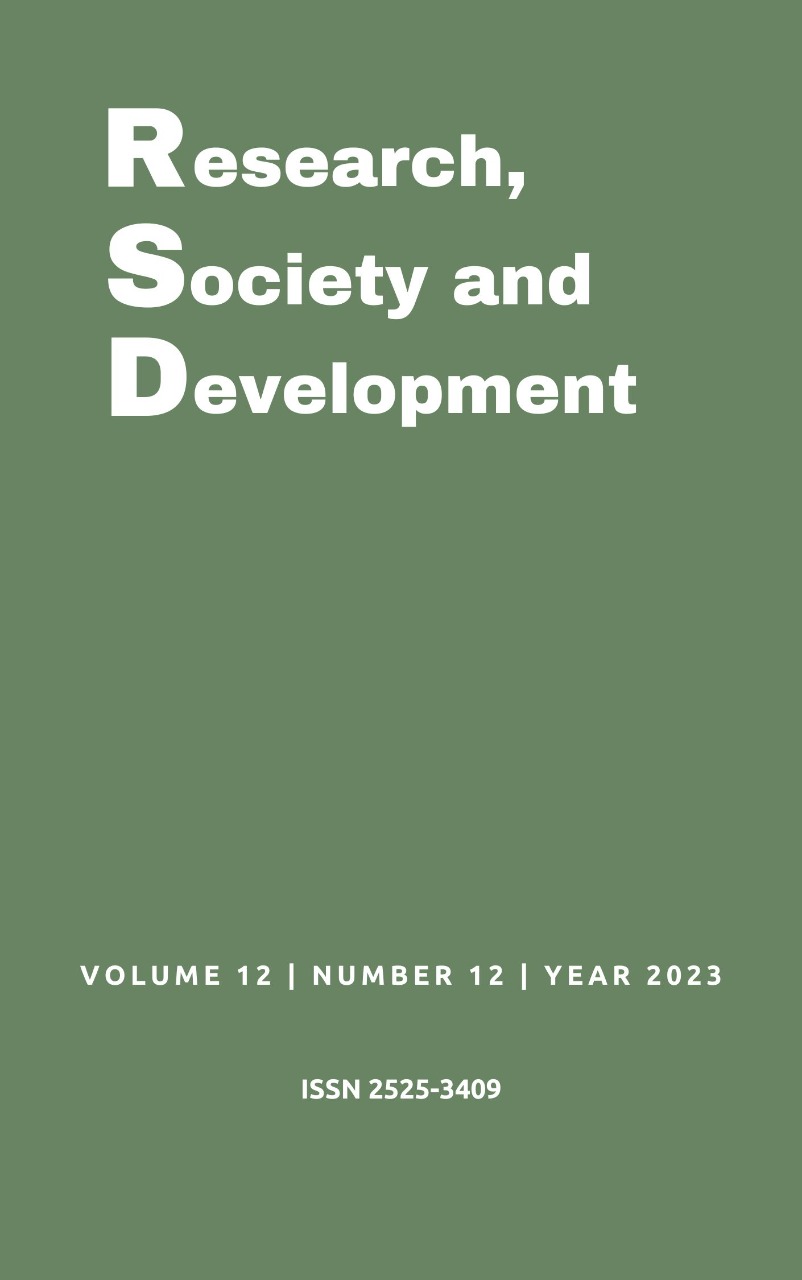Loss of corneal endothelial cells and change in corneal thickness after cataract surgery: A narrative review of the literature
DOI:
https://doi.org/10.33448/rsd-v12i12.43656Keywords:
Cataract, Corneal endothelium, Phacoemulsification.Abstract
Cataracts are a common eye disease and remain the leading cause of reversible blindness worldwide. Until a few years ago, cataract surgery was indicated only after a very pronounced loss of vision. With the evolution of technology and the advent of phacoemulsification, the indication for this surgery is increasingly earlier. However, it continues to present challenges and risks. Intraocular manipulation, such as that occurring during phacoemulsification cataract surgery, causes fluid turbulence and lens fragments, which can lead to endothelial damage, resulting in transient impairment of function or permanent cell loss. The present study aims to evaluate the loss of endothelial cells, and their impact, in patients undergoing cataract surgery. This is a narrative review, where the number of endothelial cells and corneal thickness will be compared, before and after phacoemulsification cataract surgery. More than 20 articles will be used, with their data systematically analyzed and compared. It is expected that the factors most commonly associated with greater endothelial losses and possible visual disorders will be elucidated, as well as the safety assessment of cataract surgery nowadays.
References
Abib, F. C. How many cells are supposed to be counted on the specular microscopy exam? Arquivos Brasileiros de Oftalmologia, 73 (3), 304-305. https://doi.org/10.1590/S0004-27492010000300020
Britto, V. S. et al. (2020). Aplanamento corneano após DMEK associado a facoemulsificação em paciente com distrofia endotelial de Fuchs, ceratocone e catarata. Revista Brasileira de Oftalmologia, 79 (5), 341-343. https://doi.org/10.5935/0034-7280.20200073
Chlasta-Twardzik, E., Nowinska, A., & Wylegala, E. (2021). Corneal complication after femtosecond laser-assisted cataract surgery: A case report. Medicine (Baltimore), 100 (2), e24013. https://doi.org/0.1097/MD.0000000000024013
Conrad-Hengerer, I. et al. (2013). Perda de células endoteliais da córnea e espessura da córnea convencional em comparação com cirurgia de catarata assistida por laser de femtosegundo: três meses de acompanhamento. Journal Cataract Refract Surg, 39, 1307–1313
Ferreira, M. L. (2016). Avaliação das Alterações da Estrutura da Córnea após Cirurgia de Catarata por Laser de Femtosegundo. (Dissertação (mestrado). Universidade Nova de Lisboa
Holanda, A. G. S. (2012). Estudo comparativo dos efeitos da metilcelulose a 2% e 4% sobre as células endoteliais corneanas de pacientes submetidos à facoemulsificação. Tese (Doutorado em Farmacologia) - Faculdade de Medicina, Universidade Federal do Ceará, Fortaleza
Hsieh, T. efc nb t al. (2021). Simultaneously Monitoring Whole Corneal Injury with Corneal Optical Density and Thickness in Patients Undergoing Cataract Surgery. Diagnostics, 11 (9). https://doi.org/ 10.3390/diagnostics11091639
Kacerovska, J. et al. (2013). Desenvolvimento do número de células endoteliais após cirurgia de catarata realizada por femtolaser em comparação com facoemulsificação convencional. Cesk Slov Oftalmol, 69 (15), 215–218
Lima, J. M. et al. (2019). Principais complicações no pós-operatório de cirurgia de catarata: uma revisão integrativa de literatura. Trabalho de Conclusão de Curso apresentado como requisito para obtenção do título de Graduação em Medicina, pela Universidade Federal de Campina Grande, Cajazeiras- PB
Marback, E., & Melo, C. L. (2010). Dupla membrana de Descemet após ceratoplastia penetrante – abordagem cirúrgica durante a facoemulsificação: relato de caso. Arquivos Brasileiros de Oftalmologia, 73 (6), 531-533. https://doi.org/10.1590/S0004-27492010000600013
Marques, A. et al. (2015). Análise do astigmatismo corneano nos candidatos a cirurgia de catarata. Revista Sociedade Portuguesa de Oftalmologia, 39, 23-29. https://doi.org/10.48560/rspo.6876
Mastropasqua, L. et al. (2017). All laser cataract surgery compared to femtosecond laser phaco emulsification surgery: corneal trauma. International Ophthalmology. 37 (3), 475-82. . https://doi.org/10.1007/s10792-016-0283-7
Raskin, E. (2009). Análise dos efeitos da direção do bisel da caneta de facoemulsificação no endotélio corneal (Dissertação (Mestrado). Universidade de São Paulo, Ribeirão Preto
Reis, E. (2010). Cirurgia de catarata com laser Femtosegundo versus facoemulsificação convencional em pacientes com distrofia de Fuchs. eOftalmo, 7 (2), 101-106. https://doi.org 10.17545/eOftalmo/2021.0015
Santhiago, M. R. et al. (2009). Perfil do paciente com ceratopatia bolhosa pós-facectomia atendidos em hospital público. Revista Brasileira de Oftalmologia, 68 (4): 201-205. https://doi.org/10.1590/S0034-72802009000400003
Souza, M. T, Silva, M. D., & Carvalho, R. (2010). Revisão integrativa: o que é e como fazer. Einstein (São Paulo), 8 (1), 102-106. https://doi.org/10.1590/S1679-45082010RW1134
Stumpf, S., & Nosé, W. (2006). Estudo do endotélio corneano em cirurgias de cataratas duras: extração extracapsular planejada da catarata e facoemulsificação. Arquivos Brasileiros de Oftalmologia, 69 (4), 491-496. https://doi.org/10.1590/S0004-27492006000400007
Valbon, B. F. et al. (2009). Hipertensão ocular “mascarada” por edema de córnea após cirurgia da catarata. Revista Brasileira de Oftalmologia, 8 (6): 348-54. https://doi.org/10.1590/S0034-72802009000600006
Valbon, B. F. et al. (2015). Biomecânica da córnea após laser de femtossegundo na cirurgia de catarata. Revista Brasileira de Oftalmologia, 74 (5), 297-302. https://doi.org/10.5935/0034-7280.20150061
Whittemore, R., & Kathleen, K. (2005). The integrative review: updated methodology. Journal of advanced nursing, 52 (5), 546-53. https://doi.org/10.1111/j.1365-2648.2005.03621.x
Downloads
Published
Issue
Section
License
Copyright (c) 2023 Paulo Franco de Oliveira; Maria Fernanda Franco Santos; Ana Carolina Matiotti Mendonça; Carla Pereira Santos Porto

This work is licensed under a Creative Commons Attribution 4.0 International License.
Authors who publish with this journal agree to the following terms:
1) Authors retain copyright and grant the journal right of first publication with the work simultaneously licensed under a Creative Commons Attribution License that allows others to share the work with an acknowledgement of the work's authorship and initial publication in this journal.
2) Authors are able to enter into separate, additional contractual arrangements for the non-exclusive distribution of the journal's published version of the work (e.g., post it to an institutional repository or publish it in a book), with an acknowledgement of its initial publication in this journal.
3) Authors are permitted and encouraged to post their work online (e.g., in institutional repositories or on their website) prior to and during the submission process, as it can lead to productive exchanges, as well as earlier and greater citation of published work.


